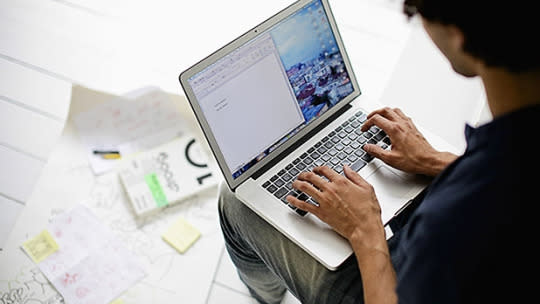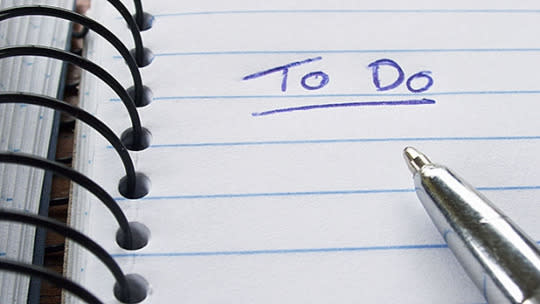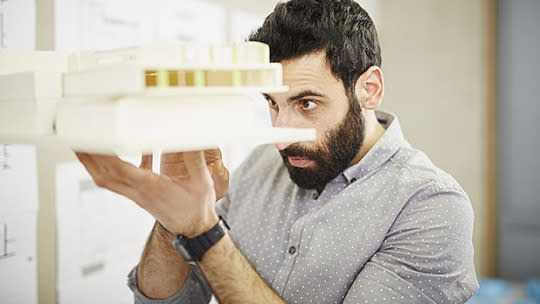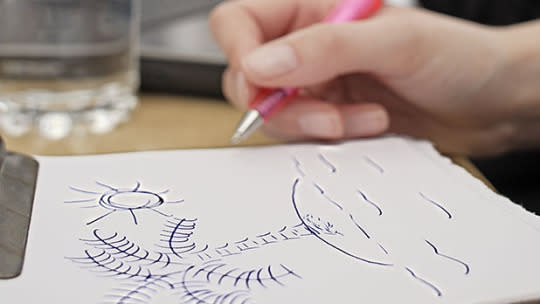How to Work Without Distraction

(Photo Courtesy of Alys Tomlinson / Getty Images)
With your phone constantly pinging, co-workers dropping by your desk, and friends emailing you must-watch videos, it’s tough to stay focused at work. Too many unexpected interruptions can tank productivity. But a certain amount of distraction is normal — even healthy. “It’s just human nature to be distracted, especially by social things,” says David Rock, director of the NeuroLeadership Institute and author of Your Brain at Work. In fact, he says, fighting the urge to break concentration can derail your focus even more than what caught your attention in the first place.
Keep a to-do list, but make it short.

(Photo Courtesy of Alex Hinds / Getty Images)
Compiling a to-do list can help you prioritize tasks and stay focused. But these lists often backfire, says Rock, because we fill them up with too many tasks. As the day rolls on and we see only a few items crossed off, we freak out because we “got nothing accomplished” and become more frustrated than focused. Make shorter lists. “Jot down no more than three tasks that you’re absolutely committed to tackling,” Rock says.
Related: 8 Ways to Improve Your Time Management Skills
Save the stressful stuff for later.

(Photo Courtesy of Thomas Barwick / Getty Images)
Kicking off the workday with a heated meeting or fiery phone conversation will hinder you from settling back into a productive workflow. To minimize the impact of stressful situations on the rest of your day, Rock suggests scheduling them in the afternoon. That way, if you do have a hard time refocusing, there won’t be as much valuable time lost.
Do creative work first.

(Photo Courtesy of Kelvin Murray / Getty Images)
Research shows most people are much more creative in the mornings. “Creative work requires a lot of mental resources, which get tired out by all the decisions you make managing emails and answering phone calls,” Rock says. Instead of sifting through your inbox first thing, dive right into a more involved project. “It’s best to harness your brain’s natural rhythms,” says Rock. “If you do creative work first, while your brain is still quiet, you’ll have more breakthroughs.”
Related: 5 Tips to Boost Creativity
Work in blocks.

(Photo Courtesy of Reza Estakhrian / Getty Images)
If you chain yourself to a single project until it’s finished, you’re bound to hit a wall, and your weary brain will be begging for distractions. Instead, work on multiple items in chunks. “When you take a break from one high-level task, move onto another that also requires deep thinking, and then come back with a fresh mind, you’ll see the original project differently and have new insights,” says Rock.
Beware big meals, and skip sugary snacks.

(Photo Courtesy of John Carey / Getty Images)
The brain needs glucose for every decision, says Rock. If you eat a monster breakfast, fast for five or six hours, and then repeat the cycle with a large lunch, you’ll have glucose surges and crashes, which will hamstring brainpower. To keep your mind fueled, Rock advises eating several smaller meals and avoiding blood sugar–spiking refined sugars.
Related: 7 Reasons You Should Quit Facebook
Keep your workspace tidy.

(Photo Courtesy of Seth K. Hughes / Getty Images)
“Your physical environment has a surprisingly big impact on your mood and performance,” says Rock. “Unless you’re someone who thrives on chaos, a messy desk will subconsciously make you feel uneasy, pulling your attention away from work.” Besides keeping your office space in order, also fill it with positive images, such as framed photos of your family or a shelf full of vacation mementos. Rock says surrounding yourself with these things will help you stay upbeat throughout the day, which in turn fosters focus and creativity.
Take brain breaks.

(Photo Courtesy of Getty Images)
If you have been laboring over an important report and have hit an impasse, grab a crossword puzzle, water your office plants, or change the ink cartridge in your printer. “There is such a thing as thinking about something too much,” Rock says. “Doing another task that doesn’t require much effort or creates more noise in your brain can help you refocus and have a breakthrough.”
Related: 11 Things You Probably Didn’t Know About Your Brain
Silence distracting sounds.

(Photo Courtesy of Thomas Tolstrup / Getty Images)
It’s impossible to stay on task when every new email, text, and voicemail makes a distracting noise. Unless you’re expecting an important message, turn off notifications and switch your phone to airplane mode. If you work in a busy office, wear headphones. “It’s a knee-jerk reaction to want to hear other people’s conversations and understand their thoughts and feelings, so do whatever you can to shut yourself off from outside noises,” Rock says.
Go ahead and doodle.

(Photo Courtesy of Peter Cade / Getty Images)
If doodling during staff meetings helps you pay attention, go for it. “Doodling really helps some people stay more connected to the work at hand,” he explains. That’s because aimlessly inking up your notepad is a very lightly taxing task. Rather than command all of your attention, it unifies various neural pathways in the brain to help you concentrate, retain information, and have new insights.
Related: 10 Apps That Will Extend Your Life
Plan for tomorrow.

(Photo Courtesy of Thomas Barwick / Getty Images)
In many jobs, you never know for sure what tomorrow’s workload will entail. But if you at least try to get a sense of it before you sign off for the evening — make one last swoop through your inbox, check your appointment book — you’ll be less likely to be caught off-guard by potential distractions the next day, Rock says.
By Melaina Juntti
More from Men’s Journal:
10 Ways Technology Can Harm Your Health
